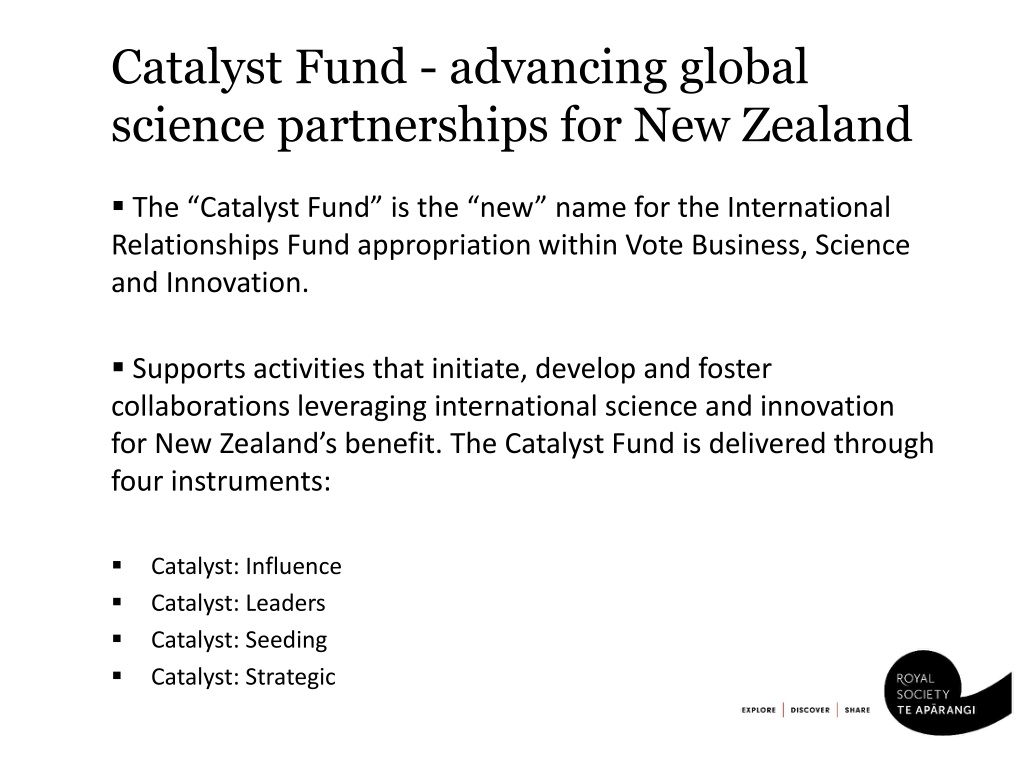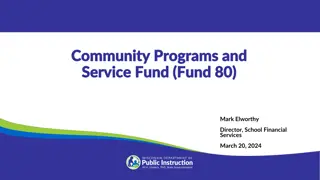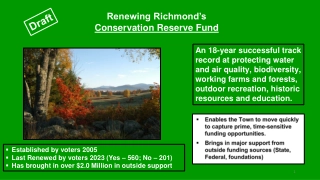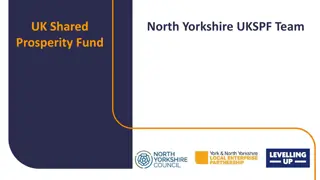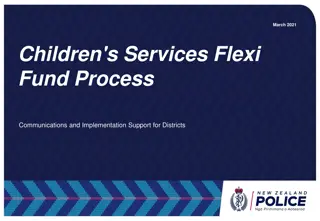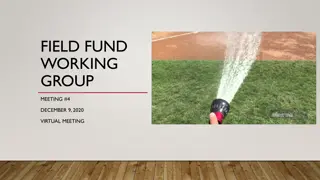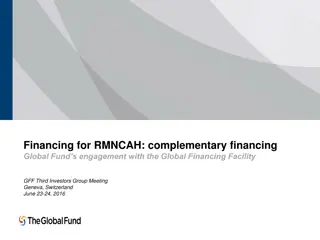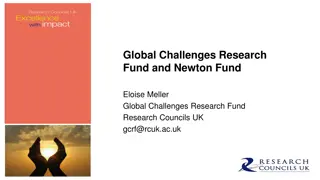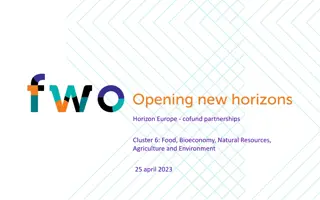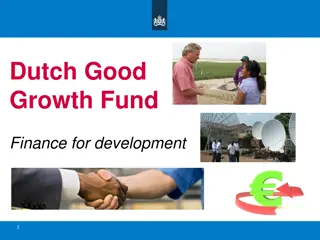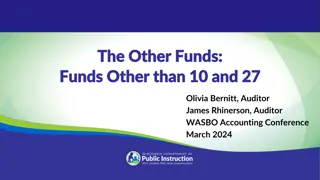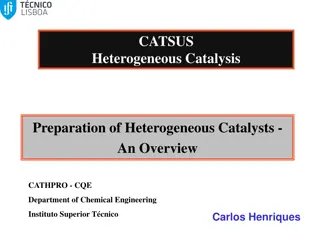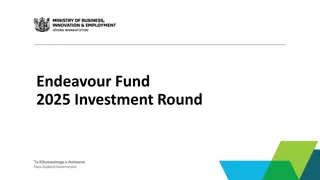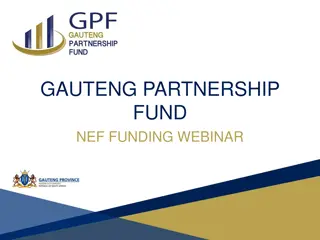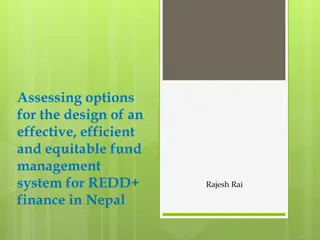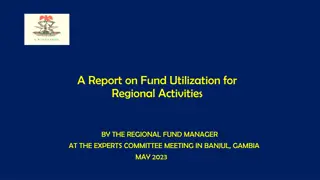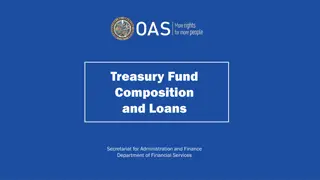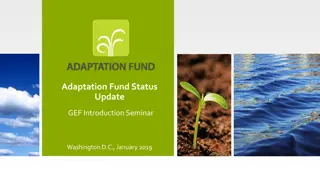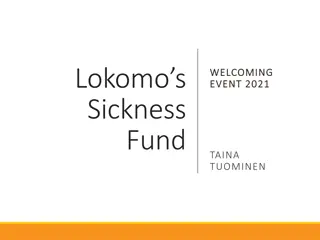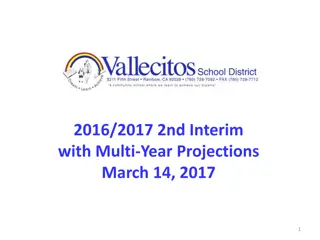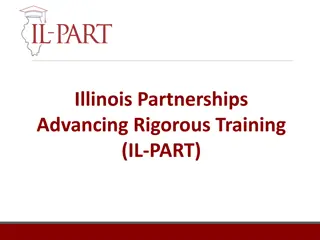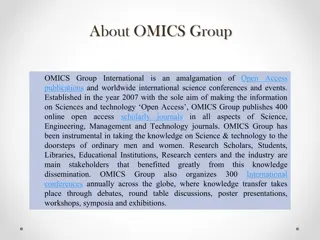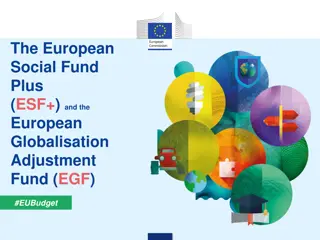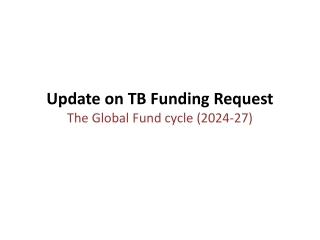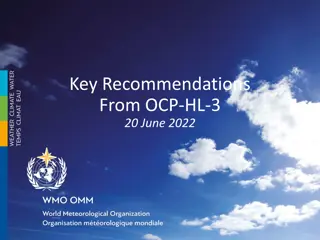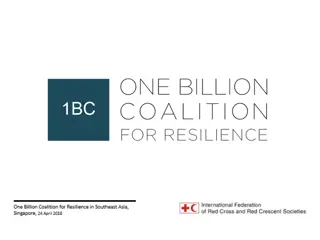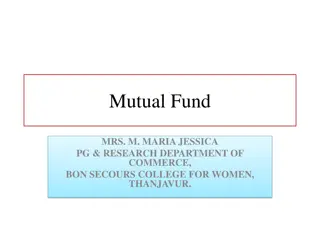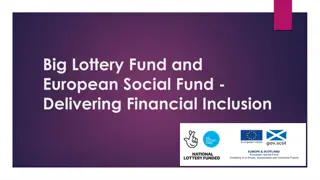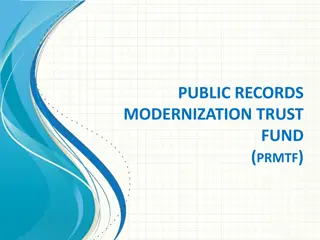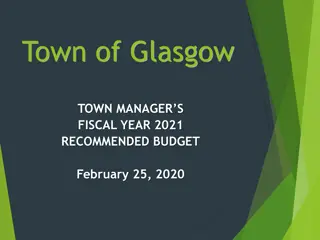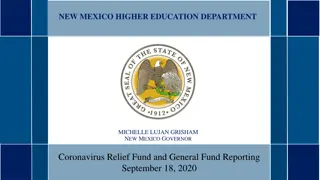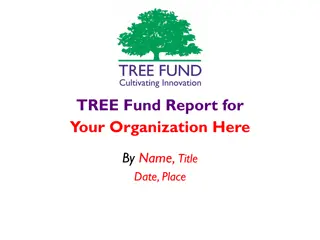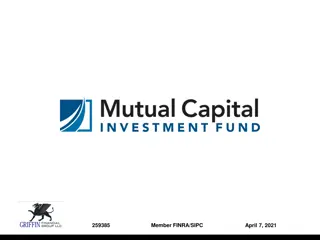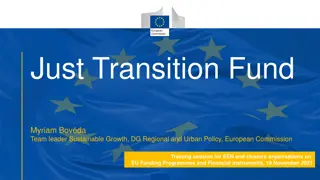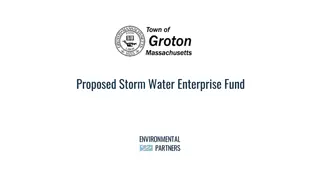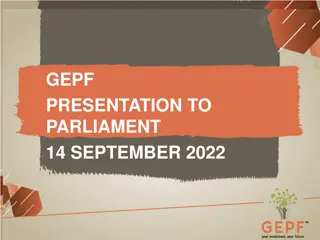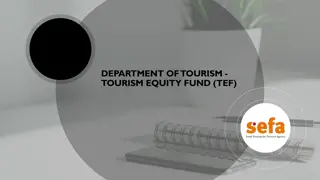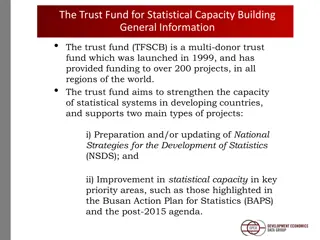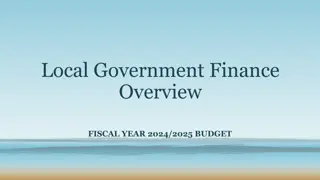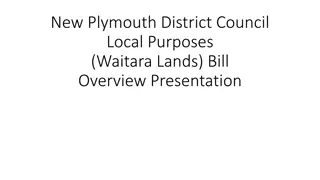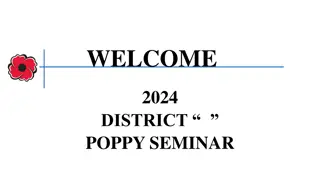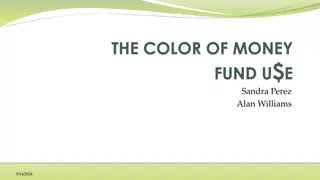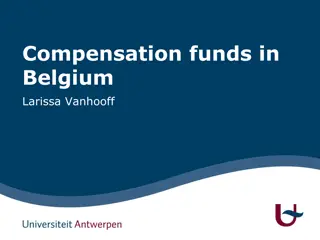Advancing Global Science Partnerships through the Catalyst Fund
The Catalyst Fund, formerly known as the International Relationships Fund, supports collaborations leveraging international science and innovation for New Zealand's benefit. It offers four instruments, including Catalyst: Seeding, which facilitates small and medium pre-research strategic partnerships. Funding of up to NZ$80,000 is available for projects lasting up to two years, promoting enduring international science partnerships for New Zealand. Researchers from various countries can collaborate in different fields of research, science, and technology.
Uploaded on Oct 08, 2024 | 0 Views
Download Presentation

Please find below an Image/Link to download the presentation.
The content on the website is provided AS IS for your information and personal use only. It may not be sold, licensed, or shared on other websites without obtaining consent from the author. Download presentation by click this link. If you encounter any issues during the download, it is possible that the publisher has removed the file from their server.
E N D
Presentation Transcript
Catalyst Fund - advancing global science partnerships for New Zealand The Catalyst Fund is the new name for the International Relationships Fund appropriation within Vote Business, Science and Innovation. Supports activities that initiate, develop and foster collaborations leveraging international science and innovation for New Zealand s benefit. The Catalyst Fund is delivered through four instruments: Catalyst: Influence Catalyst: Leaders Catalyst: Seeding Catalyst: Strategic
Catalyst: Seeding Facilitates new small and medium pre-research strategic partnerships that cannot be supported through other means, and with a view to developing full collaborations that could be supported through Catalyst: Strategic over time. Three annual calls Call JANUARY Open Date 26 January 2023 Close Date 20 April 2023 Programmes General General New Technology Programme Dumont d Urville NZ-France Science & Technology Support Programme APRIL 27 April 2023 20 July 2023 Zealand - Germany Science & General New Programme JULY 27 July 2023 19 October Zealand Japan Joint Research
Catalyst: Seeding Programme Partner Application(s) Required Allowable expenses NZ$ Funding (GST exclusive) General International New Zealand Travel, research expenses, expenses related to hosting workshops Up to $80,000 in total for up to two years Sub-Programme New Zealand Germany Science & Technology Programme Germany New Zealand and Germany Travel and related expenses Up to $80,000 in total for up to two years Dumont d Urville NZ-France Science & Technology Support Programme France New Zealand and France Travel, research expenses, expenses related to hosting workshops Up to $80,000 in total for up to two years New Zealand Japan Joint Research Projects Japan New Zealand and Japan Travel, research expenses, expenses related to hosting meetings Up to $60,000 in total for up two years
Catalyst: Seeding General Background Supports new small and medium pre-research strategic partnerships that cannot be supported through other means, and with a view to developing full collaborations that could be supported through Catalyst: Strategic Fund/other funding. Objective To enhance knowledge creation in New Zealand by linking with world-class international research groups, infrastructure and initiatives, To create enduring international science partnerships for New Zealand by providing multiple scale pre-research collaboration and a line of sight through to Catalyst: Strategic. International Partner and Field of Research open to collaborations with researchers from any country (incl. Japan, Germany, and France) within all fields of research, science and technology. Funding A maximum of NZ$80,000 (GST Exclusive) in total is available per Proposal for projects lasting up to two years. The funding is unilateral.
Ring-fenced bilateral Catalyst: Seeding programmes New Zealand Japan Joint Research Projects - Funding up to NZ$180,000 allocated to support New Zealand Japan Joint Research Projects. - NZ funding up to $60,000 per proposal for New Zealand team. - Japanese team funding by Japan Dumont d Urville New Zealand-France Science and Technology Support Programme - Funding up to NZ$160,000 allocated to support the Dumont d Urville Science and Technology round - NZ funding up to NZ$80,000 per proposal for New Zealand team. - French team funded by France New Zealand-Germany Science & Technology Programme - Funding up to NZ$240,000 allocated to support New Zealand Germany Science & Technology Programme - NZ funding up to NZ$80,000 per proposal - German team funded by Germany - Field of Research must be related to Climate Change (physical processes, social-economic dimension and adaptation - TBC)
Catalyst Seeding assessment criteria Criterion 1: Enduring collaboration (weight in assessment 30%) Track record of the New Zealand PI and Collaboration Partner (relative to opportunity) Clearly demonstrated excellence of the Partner Institution(s) Potential of the collaboration to create an enduring partnership. Ability of the Project Team to deliver on proposed activities. Criterion 2: Novel knowledge and partnership (weight in assessment 40%) How the Collaboration Partner will bring world-leading knowledge that complements the New Zealand Project Team members skills and knowledge. How the proposed collaboration will support a new partnership or a new research focus for an established collaboration. Criterion 3: Strategic benefits (weight in assessment 30%) Ability to leverage international investment, facilities and infrastructure not available in New Zealand. Clearly demonstrated pathway to build a substantive collaboration beyond an initial engagement that is in line with New Zealand s science priorities. Ability of Project Team to use the partnership to initiate links with relevant New Zealand research capabilities beyond the participating institutions.
Criteria 3: Criterion 3: Strategic benefits Contineud Clearly demonstrated pathway to build a substantive collaboration beyond an initial engagement that is in line with New Zealand s science priorities. New Zealand science priority may refer to high priority research fields as evidenced by links to a CoRE, NSC, biodiversity documents, local government priorities, or any other science priority argued in the proposal.
Common feed-back for unsuccessful Catalyst Seeding applications Inability to clearly demonstate that the proposed collaboration is a distinctively new focus for collaborarion partners that have previously worked together. Not made clear how the project aligns with a New Zealand Science priority and what it will bring. Demostrating exellence of partner instituion and collaborator Demonstrating complimentary skills and the leverage of existing international expertise. Inability to clearly articulate outcomes of the proposed project Lack of demonstrated M ori engagement where this was deemed necessary by panellists Inability to write to the assessment criteria
Catalyst Seeding and Horizon Europe Following the agreement, in late 2022, between MBIE and the European Commission, on Treaty text for New Zealand s Associate Membership of Horizon Europe, New Zealand researchers and their organisations can now participate in bids for funding under Horizon Europe Pillar II programmes on equal footing with their European counterparts. The Catalyst Seeding programme is an excellent way to build European research connections if you re thinking about a Horizon Europe bid but don t yet have a strong collaboration with a European partner. However, no preference will be given in the Catalyst Seeding bid assessment processes to projects which involve European partners. If you are interested in Horizon Europe but couldn t make the recent MBIE roadshow meeting in your region, you can obtain a copy of the presentation made at the event - or have any questions regarding Horizon Europe Association answered - by e-mailing New Zealand National Contact Point NZNCP@mbie.govt.nz.
Catalyst: Leaders Supports incoming and outgoing targeted international fellowships for exceptional individuals that cannot be supported through other means Three annual calls Call JANUARY Open Date 26 January 2023 Close Date 20 April 2023 Sub-programmes International Leader Fellowships New Zealand - China Scientist Exchange Programme JSPS Postdoctoral Fellowships Julius von Haast Fellowship APRIL 27 April 2023 20 July 2023 HOPE Meeting (TBC) JULY 27 July 2023 19 October Falling Walls Lab (separate application process)
Catalyst: Leaders Sub- Programme International Leader Fellowships Brief Description Durati on 1 to 3 years NZ$ Funding (excl. GST) Per annum: $20,000 Stipend $20,000 Research $10,000 Host admin Awards Supports exceptional individuals from any country outside New Zealand to catalyse science and innovation capability and capacity in New Zealand for a minimum of 4 weeks per year for up to 3 years Up to 3 Julius von Haast Fellowship Award Supports an internationally recognised researcher from Germany to undertake research in New Zealand for a minimum of 4 weeks per year 3 years Per annum: $20,000 Stipend $20,000 Research $10,000 Host admin Up to 1 NZ-China Scientist Exchange Programme JSPS HOPE Meeting Supports the development of research linkages with China by enabling New Zealand researchers to visit Chinese research organisations Supports excellent PhD students and/or young researchers to attend the HOPE meetings with Nobel Laureates in Japan 4 weeks Flights and daily living allowance Up to 10 5 days Flights, accommodation, and meeting registration Up to 5 JSPS Postdoctoral Fellowship* Supports young and excellent New Zealand postdoctoral researchers doing research in Japan 12 24 months Flights, insurance and living allowance Up to 5
New Zealand New Zealand- -China Scientist Exchange Programme China Scientist Exchange Programme Objective Objective Encourage and facilitate greater understanding and development of research linkages between the two countries in jointly agreed priority research fields for collaboration. Activity Description Activity Description Enable up to 10 up to 10 excellent New Zealand researchers to travel to mainland China and collaborate with researchers in mainland Chinese institutes for a four Researchers can visit more than one Chinese research institute as part of the exchange. four- -week period week period (2-6 weeks) Beijing Orientation Beijing Orientation Exchange is expected to start with orientation ceremony in Beijing on 18 October (unless otherwise approved by the Society and CSTEC) Funding Funding Travel, accommodation and daily allowance (no funds for research costs). Traveler is responsible for their own visa application, travel and medical insurance Fields of Research Fields of Research Preference will be given to those applications under the listed priority research fields: Water Research Food Safety and Security Non-communicable disease.
International Leader Fellowship Background The Programme enables a Fellow to catalyse science and innovation capability and capacity development in New Zealand for a minimum of four weeks per year for up to three years. Objective To support the attraction by New Zealand Research Organisations (the Hosts) of international fellows who can have a catalytic impact on New Zealand science capabilities and promote the importance of international cooperation in science. International Partner and Field of Research open to researchers from all countries and all fields of research, science and technology. Funding (per annum for up to three years) NZ$20,000 maximum stipend paid to the Leader via the New Zealand Host; NZ$20,000 maximum research and travel allowance* paid to the Host; and; NZ$10,000 maximum host institution administration allowance paid to the Host. * Travel allowance for International leader travelling to, and around, New Zealand
Catalyst Fund - advancing global science partnerships for New Zealand How to apply: Applications must be submitted through Catalyst Fund Application Portal Contact your Research Office for log-in details Current open call (January) closes on Thursday 20 April, 2020
Expression of Interest for Catalyst Reviewers: To be considered for January Call, EOIs must be received 3 weeks before call closing date For more information: https://royalsociety.org.nz/what-we-do/funds-and- opportunities/catalyst-fund/reviewing-proposals/
For more information Troels Petersen Programme Manager - Research Fellowships & International (04) 470 5764 Catalyst Fund (RSNZ) Email:International.Applications@royalsociety.org.nz Website: https://royalsociety.org.nz/what-we-do/funds-and- opportunities/catalyst-fund/
Established in 1989 Supported by: Australia, Canada, France, Germany, India, Israel, Italy, Japan, Republic of Korea, Norway, New Zealand, Singapore, Switzerland, United Kingdom, United States of America, South Africa, European Commission Headquarters in Strasbourg, France (www.hfsp.org) Annual budget: ~ USD 60M = NZD 81M New Zealand Membership administered by Royal Society Te Ap rangi on behalf of MBIE
HFSPO promotes and funds basic research innovative, cutting edge research to extend the frontiers of life sciences focused on the elucidation of the sophisticated and complex mechanisms of living organisms HFSPO attaches the highest importance to scientific merit internationality (especially intercontinentality) and interdisciplinarity
Types of awards Research Grants (Program and Emerging Investigator Grants) Postdoctoral Fellowships Long-Term Fellowships - postdocs in the life sciences Cross-Disciplinary Fellowships - postdocs from non-biological sciences Value and duration of awards Research Grants Maximum US$ 450,000 per annum for 3 years Fellowships - living allowance as well as a research and travel allowance, 3 years Timetable Research Grants registration 21 March; Letter of Intent closes 30 March; Full invited appliicaation mid-September Fellowships EOI 11 May; Full invited applications 28 September
Research Grants: Objectives Stimulate novel, daring ideas and innovative approaches frontier research on the complex mechanisms of living organisms all levels of biological complexity preliminary results not required Develop new lines of research through new interdisciplinary collaborations Team members from outside the life sciences, working together on bold, novel, potentially transformative ideas
Frontier-extending, paradigm-shifting research into the complex mechanisms of living organisms, from molecular level to complex biological systems Basic life sciences novel, daring ideas, challenging current paradigms in the field, breaking barriers to knowledge Innovative approaches with scientists from disciplines outside the traditional life sciences no routine research ( the next logical step ) no applications that can be funded by a national research funding body no teams composed of present collaborators no collaborations within a single country Investigator driven - no specific areas prioritised other than frontier extending Science without borders - no restriction on nationality (except first PI is from a HFSP supporting country) Opportunities for scientists early in their careers
Research Grants Research grants are provided for teams of scientists from different countries who wish to combine their expertise in innovative approaches to questions that could not be answered by individual laboratories. Preliminary results are not required and applicants are expected to develop new lines of research through the research collaboration. Highly competitive Projects are expected to be at the frontiers of knowledge and therefore entail risk
Research Grants Key Aspects Three year grants Success rate ~ 4% of original Letters of Intent are funded, and ~ 10% are invited for submitting full applications ~ 40% from final review panel meeting
Postdoctoral Fellowships HFSP Fellowships Long-Term Fellowships - postdocs in the life sciences Cross-Disciplinary Fellowships - postdocs from non-biological sciences For ambitious postdoctoral scientists to undertake frontier research move into new areas of study work in a new country broaden research skills and learn new methodology work in a top laboratory
